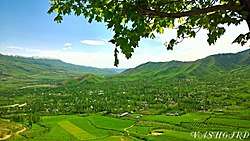Kishlak
Kishlak or qishlaq (Uzbek: qishloq, Turkmen: gyşlag, Turkish: kışlak, Azerbaijani: qışlaq, Persian: قشلاق), or qıştaq (Kyrgyz: кыштак) qıstaw (Kazakh: қыстау) is a rural settlement of semi-nomadic Turkic peoples of Central Asia and Azerbaijan. The meaning of the term is "wintering place" in Turkic languages (derives from Turkic qış - winter).[1]
.jpg)
A kishlak near Samarkand of early 1900s
Traditionally, a clay/mud fence (dewal, duval, from Persian: دیوار divār) surrounds a kishlak.
The term may be seen in the toponyms, such as Afgan-Kishlak (Uzbekistan), Yangi-Kishlak (Turkmenistan), Qışlaq (Azerbaijan) or Qeshlaq in Iran (such as Qeshlaq, Qareh Qeshlaq, and Qeshlaq Khas).
Gallery
- Kishlak in Djizak region of Uzbekistan
- Mountain village in Tajikistan
 Sap village in Navoi region of Uzbekistan
Sap village in Navoi region of Uzbekistan The village of Bobosurkhon in the Gissar district of Tajikistan
The village of Bobosurkhon in the Gissar district of Tajikistan Kishlak Nilu in Gissar district of Tajikistan
Kishlak Nilu in Gissar district of Tajikistan Shohon village in the Gissar district of Tajikistan
Shohon village in the Gissar district of Tajikistan Mirankul kishlak in the Samarkand region of Uzbekistan
Mirankul kishlak in the Samarkand region of Uzbekistan Elok village in Faizabad district of Tajikistan
Elok village in Faizabad district of Tajikistan
gollark: I don't think so.
gollark: Oh, I can edit that.
gollark: ABR isn't in here → this is impossible.
gollark: It has not.
gollark: Have things been updated since?
See also
References
- "Kishlak", Encyclopedia of Central Asia
This article is issued from Wikipedia. The text is licensed under Creative Commons - Attribution - Sharealike. Additional terms may apply for the media files.